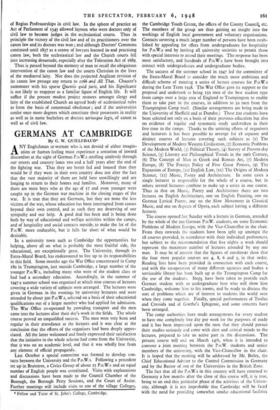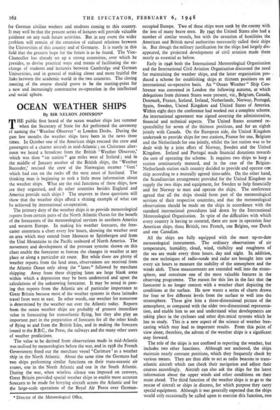GERMANS AT CAMBRIDGE
By C. W. GUILLEBAUD•
ANY Englishman or woman who is not devoid of either imagin- ation or human feeling must experience a sensation of inward discomfort at the sight of German P.o.W.s strolling aimlessly through our streets and country lanes two and a half years after the end of the fighting war. That they are better fed and housed than they would be if they were in their own country does not alter the fact that the vast majority of them are held here unwillingly and are longing to return to their homes and families. Moreover, many of them are mere boys who at the age of 17 and even younger were caught up in the German war machine in the closing stages of the war. It is true that they are Germans, but they are none the less victims of the war, whose education has been interrupted from causes beyond their own control, and as such they are deserving of our sympathy and our help. A good deal has been and is being done both by way of educational and welfare activities within the camps, and of hospitality and social contacts outside, to make the lot of the P.o.W. more endurable, but it falls far short 'of what would be desirable.
In a university town such as Cambridge the opportunities for helping, above all on what is probably the most fruitful side, the educational, are exceptionally great. The University, through its Extra-Mural Board, has endeavoured to live up to its responsibilities in this field. Some months ago the War Office concentrated in Camp ao in Trumpington, just outside Cambridge, a large number of the younger P.o.W.s, including many who were of the student class or had had a secondary education. Accordingly, in the summer of 1947 a summer school was organised at which nine courses of lectures covering a wide variety of subjects were arranged. The lectures were given in German in the evenings by university lecturers and were attended by about 30o P.o.W.s, selected on a basis of their educational qualifications out of a larger number who had applied for admission. The War Office co-operated by providing transport and the men came into the lectures after their day's work in the fields. The whole course proved an unqualified success. The men were very keen and regular in their attendance at the lectures and it was clear at the conclusion that the efforts of the organisers had been deeply appre- ciated. All the latter welcomed and freely expressed their satisfaction that the initiative in the whole scheme had come from the University, that it was on an academic level, and that it was wholly free from any element of official propaganda.. Last October a special committee was formed to develop con- tacts between the University and the P.o.W.s. Following a precedent set up inBraintree, a Civics Group of about 25 P.o.W.s and an equal number of English people was constituted. Visits with explanations and discussions have been made to the Council Chamber of the Borough, the Borough Petty Sessions, and the Court of Assize. Further meetings will include visits to one of the village Colleges, *Fellow and Tutor of St. John's College, Cambridge. the Cambridge Youth Centre, the offices of the County Council. etc. The members of the group are thus gaining an insight into the workings of English local government and voluntary organisations. Contacts covering a much larger number of persons have been estab- lished by appealing for offers from undergraduates for hospitality for P.o.W.s and by inviting all university societies to permit those with special interests to attend their meetings. The response has been most satisfactory, and hundreds of P.o.W.s have been brought into contact with undergraduates and undergraduate bodies.
The success of the summer school in 1947 led the committee of the Extra-Mural Board to consider the much more ambitious and difficult scheme of running a series of lecture courses for P.o.W.s during the Lent Term 1948. The War Office gave its support to the proposal and undertook to bring 15o men of the best student type from camps over a large area of England to Trumpington to enable them to take part in the courses, in addition to 5o men from the Trumpington Camp itself. (Similar arrangements are being made in the University of Sheffield and at Dundee.) These 200 students have been selected not only on a basis of their previous education but also on evidence of regular and systematic study undertaken in their free time in the camps. Thanks to the untiring efforts of organisers and lecturers it has been possible to arrange for 18 separate and distinct courses of lectures covering such subjects as (t) The Development of Modern Western Civilisation, (2) Economic Problems of the Modern World, (3) Political Theory, (4) Survey of Present-day Science, (5) Literary and Philosophical Trends in the 19th Century, (6) The Concept of Man in Greek and Roman Art, (7) Modern Europe, (8) The Foreign Policy of Five Great Powers, (9) The Expansion of Europe, (to) English Law, (H) The Origins of Modern Science, (12) Music, Poetry and Architecture. In some cases a single lecturer is responsible for the whole of a course, but in others several lecturers combine to make up a series in one course. Thus in that on Music, Poetry and Architecture there are two lectures on English Architecture, one on English Painting, one on German Lyrical Poetry, one on the Slow Movement in Classical Music, and one on Aspects of Opera, each subject having a different ?ecturer.
The course opened last Sunday with a lecture in German, attended by the whole of the zoo German P.o.W. students, on some Economic Problems of Modern Europe, with the Vice-Chancellor in the chair. From then onwards the students have been split up amongst the 18 courses provided, in accordance with their individual preferences, but subject to the recommendation that five nights a week should represent the maximum number of lectures attended by any one man. It may be of interest that the figures of enrolmett show that the four most popular courses are 4, 8, 6 and 5, in that order. Reading lists have been provided in connection with each course, and with the co-operation of many different agencies and bodies a serviceable library has been built up at the Trumpington Camp for the use of the students. Steps have been taken to provide each German student with an undergraduate host who will show hint Cambridge, welcome him to his rooms, and be ready to discuss the sort of problems which are of interest to students the world over when they come together. Finally, special performances of Troilus and Cressida and of Goethe's Iphigenie, and some concerts have been arranged.
The camp authorities have made arrangements for every student to have one completely free day per week for the purposes of study and it has been impressed upon the men that they should pursue their studies seriously and come with alert and critical minds to the lectures, prepared to take an active part in the discussions. The present course will end on March 14th, when it is intended to convene a joint meeting between the P.o.W. students and senior members of the university, with the Vice-Chancellor in the chair. It is hoped that the meeting will be addressed by Mr. Birley, the Chief Educational Adviser to the Control Commission in Germany and by the Rector of one of the Universities in the British Zone.
The fact that all the P.o.W.s in this country will have returned to Germany a few months after the close of this course will, it is true, bring to•an end this particular phase of the activities of the Univer- sity, although it is not improbable that Cambridge will be faced With the need for providing somewhat similar educational facilities for German civilian workers and students coming to this country. It may well be that the present series of lectures will provide valuable guidance on any such future activities. But in any event the wider problem will remain of the extension of cultural relations between the Universities of this country and of Germany. It is surely in this field that the greatest hope for the future is to be found. The Vice- Chancellor has already set up a strong committee, over which he presides, to devise practical ways and means of facilitating the ex- change of students and lecturers between Cambridge and German Universities, and in general of making closer and more fruitful the links between the academic world in the two countries. The closing meeting of the course should prove to be the starting-point for a new and increasingly constructive co-operation in the intellectual and social sphere.































 Previous page
Previous page